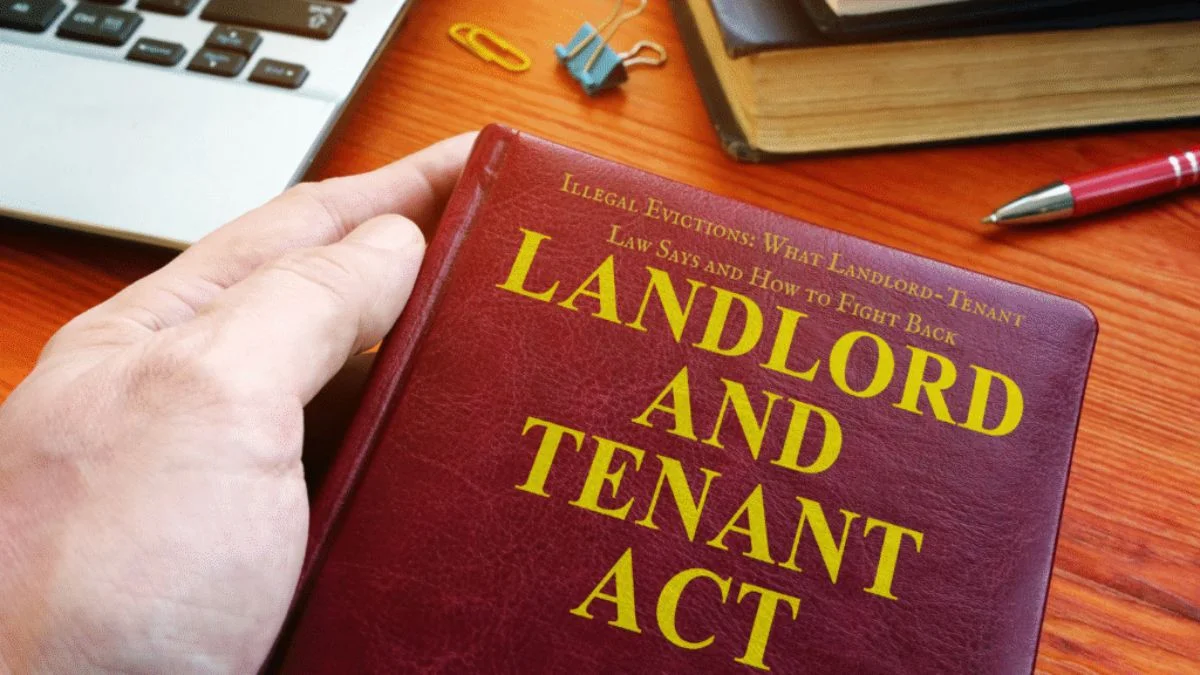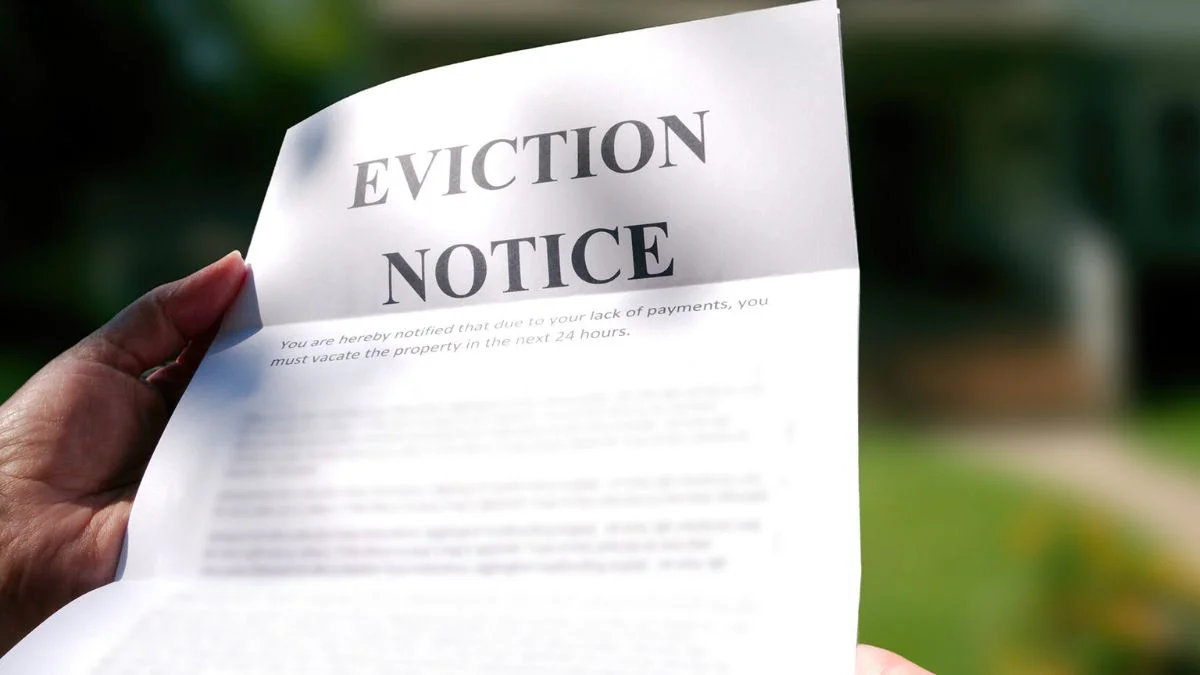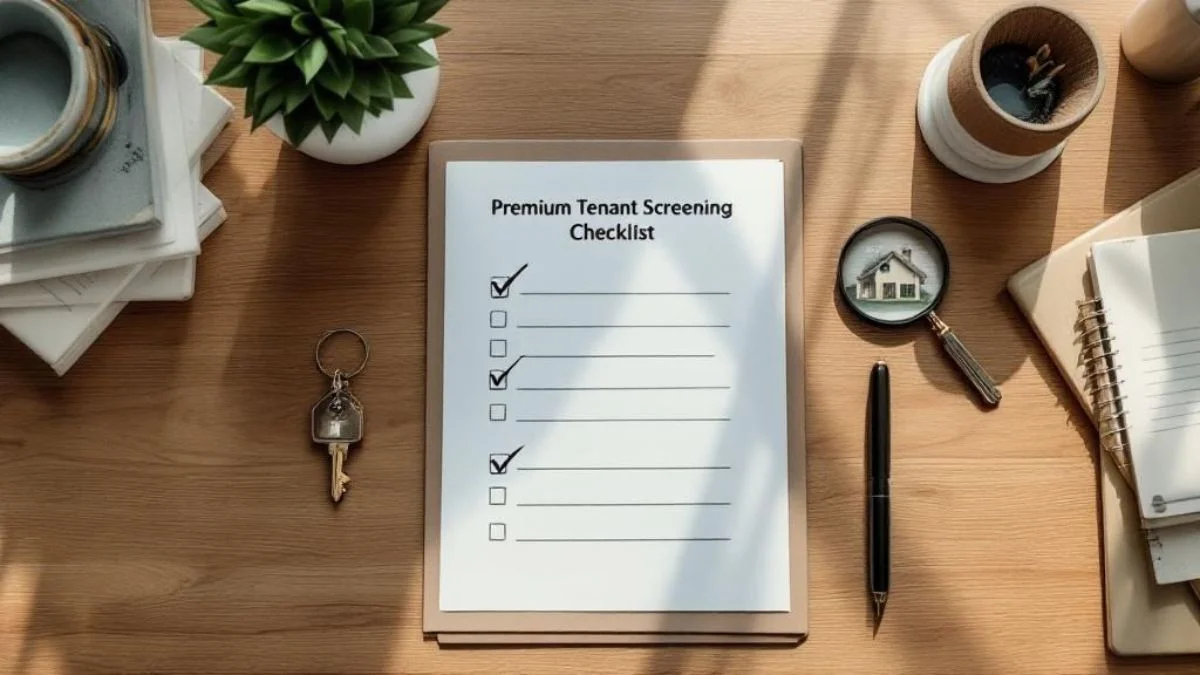When landlords face tenants involved in illegal acts, one common question arises: Can you evict a tenant for criminal activity? The answer isn’t always simple. It depends on the nature of the offense, your lease terms, and whether you're governed by federal housing rules or state landlord-tenant laws.
This article covers common reasons for eviction related to criminal activity. We'll explain the legal process and show how our tenant screening tools can help you prevent crime on your property.
What Is Eviction?
Eviction is the legal process that landlords use to force a tenant to vacate a rental property. It usually follows a breach of the lease agreement, such as nonpayment of rent, unauthorised occupiers, or criminal behaviour.
Although the eviction procedure differs from state to state, it usually entails formal notices, court proceedings, and occasionally the assistance of law enforcement in order to evict the tenant. Landlords must follow all legal requirements. If they don’t, it can lead to more problems and legal issues.

Understanding Federal Law on Evictions for Criminal Activity
To decide if you can evict a tenant for criminal activity, first understand the basics of federal eviction law.

Federal statutes, especially under 42 U.S.C. § 1437d(l)(6) and 24 CFR § 966.4(f)(12), authorize eviction from federally assisted housing based on certain types of criminal activity, even without a criminal conviction. Grounds for eviction include:
- Drug-related criminal activity on or near the premises.
- Violent criminal behavior.
- Activity that threatens the health, safety, or peaceful enjoyment of other residents or public housing staff.
- Criminal acts by household members, guests, or anyone under the tenant’s control.
Unlike criminal prosecutions, housing authorities only need to meet a “preponderance of the evidence” standard in civil eviction proceedings, meaning it's more likely than not that the conduct occurred.
However, the U.S. Department of Housing and Urban Development (HUD) encourages public housing agencies to consider mitigating circumstances before proceeding with eviction. For example, if the tenant was unaware of the activity, not directly involved, or took steps to prevent it, those factors may weigh against termination. Many housing authorities also allow for grievance hearings or lease compliance agreements in appropriate cases.
Common Reasons for Eviction Related to Criminal Activity
While eviction laws vary, here are the most common criminal scenarios that lead to removal from a rental unit:
Drug-Related Crimes and Illegal Substance Abuse
Can a tenant be evicted for drug use? Absolutely. Drug use is one of the most cited reasons for eviction. In public or federally assisted housing, drug-related activity is specifically covered under 42 U.S. Code § 1437d(l)(6), which requires leases to permit termination if the tenant, any household member, or guest engages in such activity.
This includes the manufacture, distribution, or illegal use of controlled substances within or near the rental property. These acts often violate both local housing codes and federal regulations, including the Controlled Substances Act.
If you discover drug activity by a tenant, you might consider a warning letter to the tenant for drug use before taking more severe legal steps. However, breaking a lease due to drug activity is often a reasonable option when the situation becomes serious, as long as you have sufficient evidence and follow the legal process.
Violent Behavior and Threats to Safety
Violent behavior or threats to safety are also valid grounds for eviction. This can include physical assault, verbal threats, or any other behavior that endangers other tenants, property management staff, or neighbors.
Under HUD’s 2016 Guidance on Criminal Records, landlords must ensure that any eviction based on criminal behavior is justified by a legitimate safety concern and not discriminatory. However, if a tenant poses a real, documentable threat, landlords are typically within their rights to act.
Theft, Vandalism, and Property Damage
Acts of theft, vandalism, or property damage can also lead to eviction. If a tenant is involved in criminal activities that lead to property destruction or theft, landlords can initiate the eviction process.
Landlords need to collect proof, like police reports or witness statements, to support their claims against the tenant.
Tenant Is Arrested or Incarcerated
Getting arrested or going to jail doesn't always lead to eviction. But it can become a problem if the tenant can't meet lease obligations, like paying rent or keeping the property up. It also matters if the crime happened on the property.
In some cases, the lease agreement may contain clauses allowing for termination if the tenant is convicted of certain criminal offenses. If you're not sure what to do, check the guide on how to make a tenant want to leave. It has practical steps for non-confrontational lease exits.
Can You Evict a Tenant for Criminal Activity Under Federal Law?

Yes, under federal law, landlords can evict tenants for certain types of criminal activity, even in cases where no formal conviction has occurred. This includes actions that happened both on and off the rental property, as long as the behavior threatens the safety, health, or peaceful enjoyment of others in the community:
Scope of Criminal Activity
Under federal law, eviction can occur for a wide scope of criminal activities, from drug offenses to violent crimes. For example, if a tenant assaults someone off the property but the behavior creates fear or disruption among other tenants, it may still qualify.
It's not solely limited to convictions; even arrests can justify eviction action based on the context of the behavior observed. However, landlords must act reasonably and not solely on hearsay or mere allegations.
No Requirement of Criminal Conviction
One of the most contentious features of federal eviction regulation is that a criminal conviction is not always mandatory. You can proceed with an eviction based on reliable evidence, even if the renter has not been convicted.
However, the absence of a conviction must be accompanied by evidence of the behaviour that warrants eviction. This helps to balance tenant rights with landlord interests.
Applicable to Public and Assisted Housing
Federal requirements primarily relate to public housing organisations (PHAs) and programs such as Section 8. Tenants are expected to behave properly. Noncompliance might result in eviction to provide a safe living environment.
Discretion and Tenant Defenses
While landlords may have the right to evict based on unsatisfactory behavior, there are instances where tenants can provide defenses against eviction claims.
For example, a tenant might argue they weren't aware of the criminal activity or that they took steps to prevent it. The court will consider all evidence and circumstances before making a ruling.
Notice Requirements
Federal law generally requires that tenants be given a notice to vacate, stating the reason for eviction and timeline. In some cases, especially when safety is at risk, the notice period can be shortened.
Landlords must be ready to tackle tenant defenses. They need to confirm they haven't violated any rights during eviction. This usually means giving the tenant a written notice. The notice explains why they are being evicted and allows them a chance to respond. Specific notice periods can vary but are often 14 or 30 days.
You can refer to this free lease termination letter template to ensure your documentation is clear, compliant, and professional.
The Eviction Process for Criminal Activity (Federal & State Levels)

Now that we understand the legal basis, let’s walk through the process at both federal and state levels.
Federal Level
When dealing with public or federally assisted housing programs, the eviction process may have specific nuances.
1. Notice to Tenant
You must issue the tenant a warning letter for drug usage or other unlawful behaviour. This notice must clearly state the grounds for eviction, including specific criminal acts, and inform the tenant of their right to respond. For example, a landlord who wants to evict a tenant on a month-to-month lease must give that tenant 30 days' notice. The notice period increases to 60 days for tenants with leases for one year or more.
For example: Formal Letter of Warning Tenant for criminal behavior:
2. Right to a Hearing
Tenants in public or subsidized housing programs often have the right to an administrative hearing before the eviction proceeds. This is an opportunity for the tenant to present their case and offer evidence to refute the allegations.
3. No Criminal Conviction Required
As mentioned, the landlord only needs “preponderance of evidence,” not a court conviction, to move forward.
4. Court Proceedings
If the tenant doesn’t voluntarily leave, the landlord files for eviction in court. The court will review the evidence and render a judgment.
State Level
Each state approaches eviction for criminal behaviour differently, although the overall procedure includes:
1. Evidence Gathering
This is the first and most important step. The landlord must get substantial and verifiable evidence of the tenant's criminal activities. This can include police reports, witness statements, photos, videos, or any other documentation proving the criminal conduct.
2. Lease Review
A thorough lease review is crucial. Your lease might have rules against criminal activity. It also explains what happens if you break those rules. Ensure that the tenant's conduct violates the terms of the lease.
3. Notice to Quit or Cure
Most states require landlords to give a notice to quit (vacate) or notice to cure (correct the behavior) within a specified timeframe. Understanding the notice period requirements in your jurisdiction is essential for avoiding legal missteps.
4. Court Filing
If the issue isn’t resolved, landlords can file for eviction with the local housing or district court.
5. Court Hearing
Both the landlord and the tenant will be required to appear at a court hearing. Here, both parties will present their case and offer evidence. The landlord must prove that the tenant violated the lease agreement or the law through criminal activity.
6. Judgment of Eviction
If the court rules in favor of the landlord, it issues a judgment of eviction. This allows the landlord to proceed with removing the tenant from the property.
7. Law Enforcement Eviction
Finally, suppose the tenant still doesn't vacate after the judgment of eviction. In that case, the landlord can request law enforcement (e.g., the sheriff or marshal) to physically remove the tenant from the property.
Why Landlords Must Be Aware of Criminal Activity

Understanding tenant behavior goes beyond protecting the property. It also means defending your business and supporting the community.
Legal Responsibility and Liability
As a property owner, you could be held legally responsible if you knew or should have known about crime on your property. If you did not take reasonable steps to prevent it, you may face liability. This can lead to lawsuits from victims or other residents affected by the criminal activity.
Tenant and Community Safety
Criminal activity puts the safety of other tenants, property management staff, and the surrounding community at risk. A safe place to live is one of the most important things that will bring in and keep good tenants. When criminal activity is present, other residents may feel unsafe and seek housing elsewhere, leading to higher vacancy rates.
Protection Against Criminal Tenants
Acting quickly against crime helps keep your property safe from bad tenants. These tenants might have harmful goals or break the law. If you don’t take action soon, your property might attract crime. This can make it hard to manage and lower its appeal.
Maintaining Property Value and Financial Security
Criminal activity can significantly depreciate your property's value. It may drive away good tenants, resulting in longer vacancies. This directly impacts your financial security as a landlord.
Compliance With Laws and Lease Terms
Landlords have a responsibility to comply with local, state, and federal laws, as well as the terms of their own lease agreements. Ignoring criminal activity can lead to violations of these regulations, resulting in serious legal consequences.
Insurance and Risk Management
Some insurers may deny claims or raise premiums if a landlord doesn’t address ongoing criminal activity. So, it's important to actively manage the risks linked to crime to protect your investment.
Tenant Screening: Your First Line of Defense Against Criminal Activity

Even before a lease is signed, you can take steps to prevent criminal activity on your rental property. A strong tenant screening procedure is the first and best line of defence.
Before releasing the keys, the following crucial actions should be taken by every landlord:
- Verify criminal histories, evictions, and drug-related charges by running background checks.
- Contact previous landlords for rental history verification.
- Use clear lease terms outlining consequences for illegal activity.
- Conduct regular inspections to identify warning signs early.
Importantly, tenant screening is not about discrimination; it’s about responsible property management. You're not judging character; you're assessing risk and compliance with lease expectations. That’s exactly why LeaseRunner was built - to make tenant screening smarter, faster, and safer.
With LeaseRunner, you get more than a basic credit check. Our full-service background reports include employment verification, a crucial step many landlords overlook. We handle everything:
- Contacting employers directly
- Verifying income
- Confirming current job status
Conclusion
So, can you evict a tenant for criminal activity? Yes, but it depends. Federal housing laws, state-specific procedures, and lease agreements all play a role. Whether you're dealing with drug use, violent crimes, or property damage, proper documentation, notice, and legal process are essential.
Evictions are a last resort, but sometimes a necessary one to protect the property, other tenants, and your peace of mind. By using LeaseRunner, you save valuable time and lower your chances of renting to tenants who may not be financially qualified—giving you peace of mind and protecting your investment from day one.







